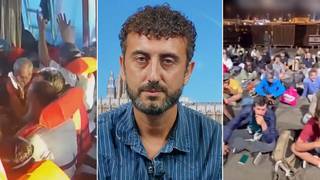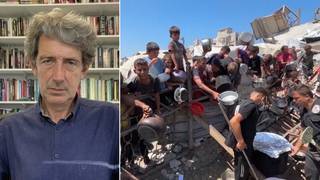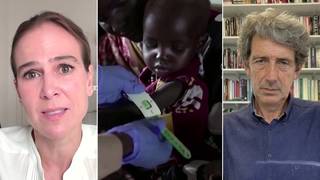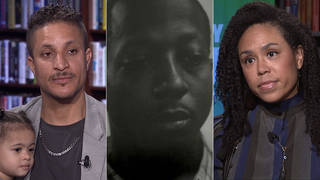
Guests
- Soffiyah Elijahexecutive director of the Correctional Association of New York, which monitors conditions in state prisons.
- Cerissa Harrellsister of Samuel Harrell.
- Samuel Harrellfather of Samuel Harrell.
We speak with family members who have just concluded a five-day hunger strike marking the first anniversary of the death of Samuel Harrell, who died after as many as 20 corrections officers kicked, punched and threw him down a flight of stairs while he was incarcerated at the Fishkill Correctional Facility in Beacon, New York. An autopsy report determined the African-American man’s death was a homicide caused by a “physical altercation with corrections officers.” Some of the officers were known around the prison as the Beat Up Squad. The superintendent at Fishkill, William J. Connolly, abruptly resigned in the weeks after the incident, and both the Dutchess County District Attorney’s Office and the U.S. District Attorney’s Office have launched investigations into the case. But more than a year later, no one has been charged in Samuel Harrell’s death, and the correctional officers involved in the assault are still working at the prison. Harrell’s father, Samuel Harrell Sr., and sister, Cerissa, discuss why they want the officers “held accountable, just like any other citizen,” and how they are calling for body cameras to be used in correctional facilities and for guards to receive better training for de-escalating misunderstandings and dealing with people who have mental illnesses.
Transcript
AMY GOODMAN: We’re on a 100-city tour, broadcasting now from the Roundhouse—that’s the state Capitol building—in Santa Fe, New Mexico, as we turn to the first anniversary of the death of Samuel Harrell, an African-American man who died April 21st, 2015, a year ago, after as many as 20 corrections officers kicked, punched and threw him down a flight of stairs while he was incarcerated at the Fishkill Correctional Facility in Beacon, New York. An autopsy report obtained by The New York Times determined Harrell’s death was a homicide caused by a “physical altercation with corrections officers.” Some of the officers were known around the prison as the Beat Up Squad. Officers then called an ambulance and told the medical crew Harrell may have overdosed on synthetic marijuana, known as K2. Harrell died that night in a nearby hospital. The autopsy showed he had no illicit drugs in his system.
A few weeks after Samuel Harrell’s death was reported by The New York Times, the superintendent at Fishkill, William Connolly, abruptly resigned. Both the Dutchess County District Attorney’s Office and the U.S. District Attorney’s Office have launched investigations into the case. But more than a year later, no one has been charged in Samuel Harrell’s death, and the correction officers involved in the assault are still working at the prison. This weekend, family members and friends of Samuel Harrell launched a five-day vigil and hunger strike to demand action. At a vigil near the prison Sunday, his sister Cerissa spoke out.
CERISSA HARRELL: Me and my family decided—and some friends, decided to do a hunger strike. The reason for the hunger strike is to give up—we’re willing to not eat, to give—you know, to get something in return. And what we want in return is justice. … It’s been a year. Nothing has happened. Does it hurt? It hurts a lot. Do I think about it? Every day. Do I forget about him? Never. … Justice will mean so much to me right now. Those COs are still working, just living their lives just like it’s just nothing, like they did nothing, like they didn’t take somebody else’s life or a part of somebody’s family and just threw it away.
AMY GOODMAN: For more, we’re joined by Sam Harrell’s father, Samuel, and his sister, Cerissa. We’re also joined by Soffiyah Elijah, executive director of the Correctional Association, which monitors conditions in New York state prisons. All three were on this hunger strike.
We welcome you all to Democracy Now! Cerissa, let us begin with you—why you came to New York and the significance of this anniversary of your brother’s death, what you want to see happen right now?
CERISSA HARRELL: Well, thank you for having me. The significance of my brother’s death, I would like to see, you know, justice be brought for him, those guards to be put on administrative leave. Like they shouldn’t be able to continue working and torturing other people while, you know, the investigation is still going. You know, coming—you know, getting the justice that we need, like the conclusion of this, will mean a lot. It shouldn’t have to take a year for them to make a decision, you know, when a life is taken. It shouldn’t have to take a year for those guards to continue to work while we have to suffer and be reminded every day of, you know, my brother’s not here. I don’t get phone calls anymore. It’s just heartbreaking that, you know, it takes so long to get change done, when, when you see wrongdoings, it should just happen automatically. Wrong is wrong, and right is right.
AMY GOODMAN: Sam Harrell, talk about your son and what you understand happened on April 21st last year.
SAMUEL HARRELL SR.: Well, I’m grateful for being here today and thank everyone for allowing us to speak as a family. I wish for everyone to realize that it’s been a hard year, but, through it all, we continue to maintain our struggle and, you know, sticking together and loving one another. Speaking about my youngest son, little Sam, whom I named after me, I miss him very much, you know, to the point that it’s very painful just to imagine the last seconds of his life, as he was trying to hold on and to do his time and serve it out and to come home. We had plans. You know, we had things that we wanted to still accomplish together. But like what happened to him was—is really a tragic ending. And it’s really hard to really visualize or really to think about it at times as, you know, life goes on without him being here. But as we—you know, as we go on day by day now, there is still a struggle for the innocence, struggle to have a reform, a reprove, and things that we would like to see happen within the system so that something like this will never happen again to another family.
AMY GOODMAN: Cerissa, you received a call from another prisoner—
CERISSA HARRELL: Yes.
AMY GOODMAN: —last year on April 21st?
CERISSA HARRELL: Yes, ma’am. I got a—
AMY GOODMAN: What did that prisoner say to you?
CERISSA HARRELL: He called, and I answered it, expecting it to be my brother. And when I heard the voice, I’m like, “Who is this?” And he’s just like, “Listen to me.” And I’m like, “OK.” Then he’s like, “Sam—something happened to Sam.” And I’m like—they called him J-Rod. That’s his nickname. So I’m like, “What do you mean?” He was like, “The guards.” He was like, “He got hit by the guards, and you need to call the jail.” I’m like, “Call the jail?” I’m like, “Well, like, is he hurt?” And they was like, “We don’t”—he was like, “I don’t know. I don’t know. Just call the jail. They took him, and he hasn’t came back. Nobody’s seen him. Nobody’s heard anything. So just call the jail.” And I’m like, “OK. Who is this?” And he hung up.
And I called his wife, Diane Harrell, called her immediately, because that’s his emergency contact. So, when I called her and I told her, I’m like, “You know, we got to call, and then we’re going to go visit him.” And she’s like, “All right.” And like not even 10 minutes after I spoke to her, she called me back and told me that they called her and told her that he was gone. I’m like, “Gone? Where?” She’s like, “He’s dead.” And I’m like, “He’s dead?” And I just—oh, I just lost it. Like, “What do you mean, he’s dead?” Like, those words, I will never—he just turned 30, December 18th. I turned 31 December 7th. We’d just seen him that Saturday. I just spoke to him that Sunday. You know? And I was expecting him to call me back that Monday, and he didn’t.
And I was just devastated, like—like I’m never going to hear his voice again. Like, we have never been apart. We’ve never been apart, except for when he got caught up, when he got in trouble and went to jail. We were like twins. We’re a year and 11 days apart. We have never been apart. So, to know that I have to live the next however many years that I’m on this Earth without him is very painful. I have an older brother, you know, but it’s—we’re used to seeing three. It’s still three, but physically it’s two now. And it hurts. It hurts a lot. And to know that we haven’t heard anything, you know, we’re just waiting, it’s—
AMY GOODMAN: Cerissa, I want to ask your dad—I want to ask Sam Harrell about your son suffering from bipolar disorder. They said he had packed his bags that night, and he said he was going home. Can you explain? And also, the way the local media covered this, talking about there was a fight, but was your son handcuffed through this beating?
SAMUEL HARRELL SR.: Yes, he was handcuffed. Prior to that, I believe there was some type of isolation, some type of punishment that they were sending him through for a number of days. He was detained in—I believe they have some type of—
CERISSA HARRELL: Solitary.
SAMUEL HARRELL SR.: —solitary confinement, known as the SHU, where they put incarcerated men for periods of days, that I see to be really horrendous. I had a chance to witness what it was like. I saw it myself. I went inside, and it’s horrible.
I also realize that what led up to—once he was released out of this solitary confinement, that his mental health, he was suffering. And due to the lack of medical attention, which I really wish that they would have had called immediately, once they had taken him out, realizing that he was making a phone call to my daughter here, saying that he was coming home, which we all knew that he was still incarcerated, but to him, he—I’m thinking he was thinking that it was—his time was up. I mean, clearly, in that instance, anyone with some type of training, any type of training, would realize that we should get him to medical attention immediately.
And instead, I heard that they called the COs over, and there were a gang of them. There was a lot of them. And what happened from there was that they didn’t handle it properly, you know, according to—I feel, according to the way the policies and procedures should have been taken. And he was handled viciously—handcuffed, kicked, thrown down stairs. You know, it was just horrendous, it was terrible, to the point where I’m sure he was about to give up and felt all alone, you know, where no one was—I mean, the people that were supposed to be watching over him were just taking full advantage of torturing him. And it ended his life.
AMY GOODMAN: I wanted to bring Soffiyah Elijah into this conversation, with the Correctional Association of New York. If you could explain what your group is, but also why you, too, participated in this hunger strike that you all just ended last night? If you could talk about where Sam Harrell was held, the particular prison, and who this Beat Up Squad was—is?
SOFFIYAH ELIJAH: Thank you. Yes, thank you, Amy. Thanks for having me. I head the Correctional Association of New York, which is an independent, not-for-profit organization, 171 years old, that has a legislative mandate, unique to it, to monitor the conditions in the prisons throughout New York state. We have focused our attention on Fishkill and the issue of violence and abuse throughout the New York state system, because what happened to Mr. Harrell, sadly, is not uncommon. It has happened many, many times. I participated in the fast with the Harrell family and in memory also of Karl Taylor, who was murdered not long before Mr. Harrell at the Sullivan facility on April 13th of 2015. There are Beat Up Squads not only at Fishkill, but at many other facilities, including Clinton and including Attica and, as I said, other facilities. So Mr. Taylor and Mr. Harrell were handcuffed and beaten viciously by a group of guards and beaten until they died from those horrific beatings.
AMY GOODMAN: We’re talking to Soffiyah Elijah, Correctional Association of New York. Talk further about what you understand took place and how it is that all these officers are still working in this prison.
SOFFIYAH ELIJAH: I’ve been informed that Mr. Harrell was attacked by a group of guards, as his father explained, after he indicated that he wanted to go home and that he was going home. And similarly, Mr. Taylor was attacked by a group of guards on April 13th. And this is what happens throughout the New York state system in prison after prison. And the guards do this with impunity. The way that the union contract protects them allows them to do these acts of viciousness and violating people’s human rights. And the administration has very little at its disposal in order to discipline them. The contract for the union is actually under negotiation right now, and my organization and other advocates have called for radical changes in this union contract so that these guards cannot continue to beat and abuse people and murder people with impunity. The guards that beat Mr. Harrell, the guards who beat Mr. Taylor and so many others are continuing to work in the corrections system, despite their violations and their crimes against people.
AMY GOODMAN: Can you talk more about the 3:00 to 11:00 shift, the shift of correction officers that killed Sam?
SOFFIYAH ELIJAH: The 3:00 to 11:00 shift, we have found at the Correctional Association, is the time period where the majority of these atrocities happen. And that is because the superintendent and the rest of the administrators leave the facility around 3:00 in the afternoon. And then the 3:00 to 11:00 shift is free to do its dirty work against the population, and there is no retribution for their actions. So, many of the atrocities that we learn about happen between 3:00 to 11:00 in the evening. And I can assure you that probably tonight, between 3:00 to 11:00, somebody someplace in the New York state system, whether they’re in a men’s facility or also in a women’s facility, will be beaten viciously, like Mr. Harrell and Mr. Taylor were.
AMY GOODMAN: Samuel Harrell had bipolar disorder. Can you talk about how people with mental illness are dealt with in the prison and how he was dealt with? I mean, you have the reports in The New York Times and other places of Sam being very depressed that day; of just staring at the TV; of his friends, other inmates asking if he was OK, if he wanted to talk. His mom had just recently died.
SOFFIYAH ELIJAH: When people have mental health challenges, they need to be placed in a therapeutic setting. And there’s nothing therapeutic about putting someone in a cage. And Mr. Harrell had recently come out of solitary confinement. And I should explain that the Correctional Association and other advocacy groups were successful a few years ago in getting a law passed called the SHU Exclusion Bill. And that mandated that people who had serious mental health diagnoses should not be placed in solitary confinement, specifically because of the harms that scientific evidence show that people suffer from being placed in solitary confinement. Solitary confinement harms everyone, but it takes particular effect on people who have mental health challenges. And so, Mr. Harrell should not have been placed in solitary confinement because of his mental health challenges. Same holds true for Mr. Taylor and many, many other people. We, as a society, need to stop placing people who have mental health challenges in prisons, because they are not going to thrive.
AMY GOODMAN: Finally, Cerissa Harrell, sister of Samuel Harrell, you finished your hunger strike last night. You’re leaving New York. What are you calling for? What do you want to see happen?
CERISSA HARRELL: What I would like to see happen, number one, those guards being accountable for their actions, like any other citizen of any state would be charged. Secondly, I would like to see body cameras being used in the correctional facilities. Thirdly, I would like to see guards getting better training for de-escalating situations and dealing with people with mental illnesses. It would—I believe it would change a lot. It would change a lot of things that’s going on in there. And if those things could, you know, get done, I think it would take—it could change a little part of a big problem. That’s just a little part. It’s a lot more that needs to happen, too, but that’s just something that we had to deal with as my family, so that’s the part that I would like to start with, you know, as a whole. So, if we can get that done, I think, you know, the prison system will be a better—it would be all right. You know, they will go in there and be able to come out rehabilitated, instead of scared and—or dead, not making it at all. Like, it’s just—
AMY GOODMAN: Well, Cerissa and Sam Harrell, I want to thank you so much for being with us. Also, our condolences. And Soffiyah Elijah of the Correctional Association of New York. We will continue to follow the case of Samuel Harrell, who was killed April 21st, 2015, in the Fishkill prison in Beacon, New York, by corrections guards.
This is Democracy Now! When we come back, it’s the 30th anniversary of the Chernobyl nuclear disaster. Stay with us.
[break]
AMY GOODMAN: The music from a vigil for Sam Harrell, here on Democracy Now!, democracynow.org, The War and Peace Report. I’m Amy Goodman.












Media Options